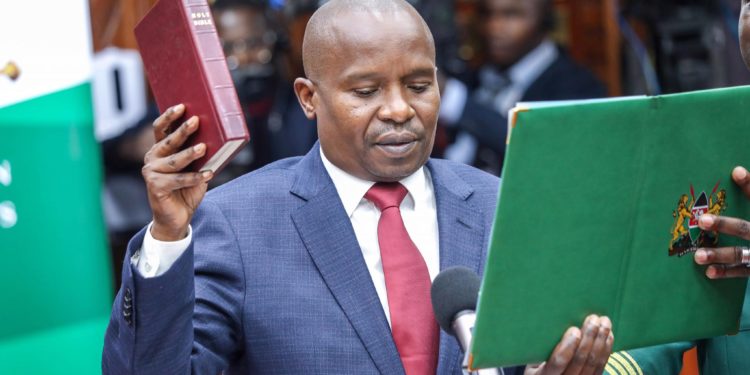Interior Cabinet Secretary nominee Kithure Kindiki faced tough questions on police brutality, identity cards and accountability during his vetting by parliament on Thursday, as he sought approval for reappointment to the crucial security docket.
Professor Kindiki, who was dismissed from the same position in July, defended his 21-month tenure and outlined plans to reform policing and national administration if confirmed. But lawmakers pressed him on the deaths of over 50 protesters during recent demonstrations and delays in issuing identity documents.
“I strongly believe that there must be justice and every death that occurred must be accounted for,” Kindiki told the vetting committee. He said investigations into protest deaths take time but promised to encourage collaboration between police and oversight bodies to “get closure” on the incidents.
The nominee faced particular scrutiny over the police response to opposition protests in July, when human rights groups say over 50 people were killed. Kindiki insisted he gave policy direction rather than operational orders to police.
“The work of the minister, the cabinet secretary for interior, as enshrined in article 245 of the constitution is to give the organs of national security that fall under that ministry policy direction and policy guidance,” he stated.
However, some lawmakers questioned whether Kindiki had become too close to police operations. “You became more of them, more of a police officer, not a civilian,” said one committee member, noting Kindiki’s frequent wearing of tactical police attire.
The professor defended donning police gear, saying it was necessary protective clothing when visiting dangerous areas. He said his field visits aimed to disseminate policy and boost morale among officers.
On identity cards, Kindiki attributed delays to court injunctions but said a backlog of applications had been reduced to 92,000. He defended a new 10-year validity period for IDs, citing the need to update embedded technology.
“The reason for the ten-year limit is because of technology,” Kindiki explained. “The third generation ID is a technology card. And technology keeps on growing old.”
Several lawmakers raised concerns about corruption in the interior ministry. Kindiki acknowledged the problem, ranking corruption among the top five security threats facing Kenya alongside terrorism, organized crime, drug trafficking and climate change.
“Going forward if I’m reappointed I am going to escalate programs, policies and measures to eradicate corruption within the organs of the national security that fall under the ministry of interior,” he pledged.
The nominee also outlined plans to reform the National Government Administration, which he said would help prevent security lapses like the Shakahola cult deaths earlier this year.
“My next assignment if I am approved by this house will be to initiate far-reaching reforms in the national government administration system to ensure that we restructure the Ngao system, make it more responsive, modernize it, and distribute it to the lowest level,” Kindiki stated.
On police welfare, Kindiki said he had implemented initial salary increases recommended by a task force. He also cited the operationalization of a police hospital and leadership academy as achievements during his previous tenure.
The professor defended Kenya’s deployment of 1,000 police officers to Haiti, saying it fulfilled international obligations without affecting domestic capabilities. He said the UN mission provides insurance coverage for the officers.
Kindiki revealed his net worth had increased by KES 150 million to KES 694 million during his 21 months as cabinet secretary. He attributed this to legal fees from his law firm and “small businesses”, denying any improper income.
“I have not benefited from any improper business. I have not done any business with government,” Kindiki insisted.
The vetting marked an unusual situation, with Kindiki seeking approval for the same position he was dismissed from just weeks ago. He framed the scrutiny positively, saying: “It’s important for public officials to be put under scrutiny and be measured using the highest possible threshold.”
If approved, Kindiki pledged to prioritize police reforms, border security, and measures to prevent femicides. He also promised to finalize regulations on public protests to balance demonstrators’ rights with public order.
The committee will now prepare a report for the National Assembly, which will vote on whether to approve Kindiki’s nomination. His fate remains uncertain given the controversy surrounding his previous tenure.
















